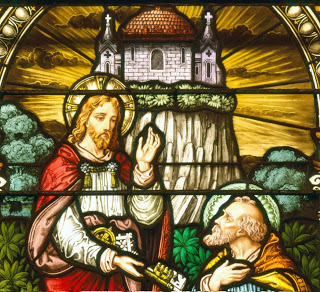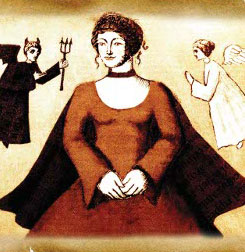A friend of mine shared this story, but my friend is a lawyer, so I’ll leave it to you to judge how true it is. (With apologies to any lawyers reading.)
My friend is a lawyer in Sydney; an expert in family law. One day an elderly couple visited his office — both were in their 80s, and they were married nearly 60 years. They wanted to divorce. My friend was startled. Why divorce now, after so many years?
The couple explained. Divorce would only formalise a long-standing reality. There was no animosity. Just a gradual drifting apart after the children left home. They lived in the same house, but they lived separately. They had separate bedrooms. They prepared their meals separately. They ate separately. They could go days without even seeing each other.
My friend agreed to assist them on one condition. For one month, they must not cook for themselves, or clean their own dishes, or even make themselves a cup of tea. When they prepared a meal or a snack, it must be for the other person. When they made a cup of tea, it must be for the other person.
A month passed, but the couple did not return. Several years later, my friend ran into the wife at a shopping centre. (He had forgotten about the case, but she recognised him and approached him.)
After introductions, he asked how her husband was. “He died last year,” she replied. “But if he was here, he would thank you. Our final years resembled our first years — doing everything for each other, and nothing for ourselves. We changed our minds about the divorce. Your advice revived our marriage.”
DISCLAIMER
Not every marriage is so easily salvaged. Not every divorce is so simply diverted.
Remember, too, that divorce is not always and everywhere sinful. Technically speaking, in the Catholic view of things there’s no such thing as divorce. Marriage is a permanent union, which only death can terminate. But there are many valid reasons for a couple to separate. Physical violence is one reason. Emotional violence is another. There’s a long list. Jesus prohibits remarriage, but he doesn’t condemn separation, which is often a necessary remedy. Divorce is an evil — it’s a terrible scourge, that causes a lot of suffering — but that doesn’t imply divorcees are bad.
I would hate for anyone to be offended by the story I just told. I’d hate for anyone to feel judged for not persevering in an unhappy marriage.
The purpose of the story is not to offer a quick fix to divorce. The purpose of the story is to illustrate the foundation of the marriage covenant: a radical spirit of service — doing everything for someone else, even at personal cost. That’s not just a working definition of the marriage covenant. It’s a comprehensive definition of love: “To love is to will the good of another.”
Love is not a business transaction: “I give to you so that you give to me.” Love is one way: “I give because I give.” Every single one of us is called to live this spirit of service.
“Love God with all your heart and with all your soul and with all your mind; love your neighbor as yourself.”
But I’ve honed in on marriage because marriage is a sacramental relationship. The spirit of service between a husband and wife is an embodiment of Christ’s love for the Church; God’s love for humanity. Holy marriage lives out what we hear in today’s Readings.
- In the Gospel: “God so loved the world, that he gave his only Son.” Giving, without an expectation of receiving.
- In the Second Reading: “God loved us with so much love that he was generous with his mercy . . . It is by grace that you have been saved, through faith; not by anything of your own, but by a gift from God.” Giving, without an expectation of receiving.
- Even in the First Reading, which describes not just God’s mercy, but God’s wrath: “The Lord roused the spirit of Cyrus king of Persia to issue a proclamation” which restored the Promised Land. Giving, without an expectation of receiving.
All of this can be described as the unconditional love of God. God’s love is unconditional. It’s good for us to repeat that to ourselves. Paul labours the point. We can’t earn God’s love. It is a free gift, given to us because, “We are God’s work of art.”
God perfects what we really struggle to imitate. All of us resemble that old couple, who at one point did nothing for each other, but who rediscovered happiness when they did everything for the other without expectation of return. I think this is “the good life” Paul refers to in the Second Reading.
But about the wrath of God described in the First Reading? And what about our Lord’s ominous words in the Gospel?
“Whoever refuses to believe is condemned . . . Men have shown they prefer darkness to the light . . . everybody who does wrong hates the light and avoids it.”
That light is the mercy of God. God’s love is unconditional; God’s mercy is not. There is one condition attached to God’s mercy: our assent. We have to be willing to step into the light. We’re free to stay in the darkness; to wallow in our sins.
Pope Francis has just announced a Holy Year of Mercy which will begin this November. He has framed his entire pontificate around mercy. He wants the world to know that the Lord’s mercy is attractive! The light is painful for a moment when we emerge form darkness, but only for a moment. Then the light is something we can bask in.
Let’s pray for the success of this project. Let’s pray for ourselves; that we will bask in the Lord’s mercy. That we are people who live in the light, and that by word and deed, we invite others into the light.
In him was life, and the life was the light of men. The light shines in the darkness and the darkness has not overcome it.
He was in the world, and the world was made through him, yet the world knew him not. He came unto his own, and his own received him not.
But to all who do receive him, who believe in his name, he gives power to become children of God.






Not a bad insight either into the relationship between law and grace. As the lawyer laid out strict and clear instructions, so to the Church when she needs, always in the hope that it will lead to love and true freedom.
Well the Western District especially and whole of Australia are in mouring because of Malcom Fraser death. He was former Prime Minister of Australia! This Electoral seat was the seat of Wannon that is my area! He had a property called Nareen Station near Coleraine sheep and beef! He sold it many years ago but it is operation. http://www.nareenstation.com.au/ Fr. John might explore it and blog about it! http://guides.naa.gov.au/malcolm-fraser/gallery/image041.aspx I d This is a true story I saw him at the Koroit Catholic church in 2001. I was there for a baptism so was he not for the same person! No I didn’t talk to him or his wife Tammy! I don’t know if they are catholics or not!
Now the Golden Slipper is on tomorrow in Sydney The race is race seven I like 2.9 and 12.
Race6 No13 Race8No8 and Race9No1.
Now the Big Bendigo meeting on tomorrow in Victoria Race4No12 Race5No3 and 14 Race6no5 and 16 Race7No8 and 13 Race8no13 Pepper the Pin and Race9No8 and 15.
Just back them all each way!
Happy Punting and Keep Well from Simon the Pieman.